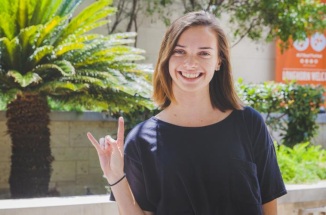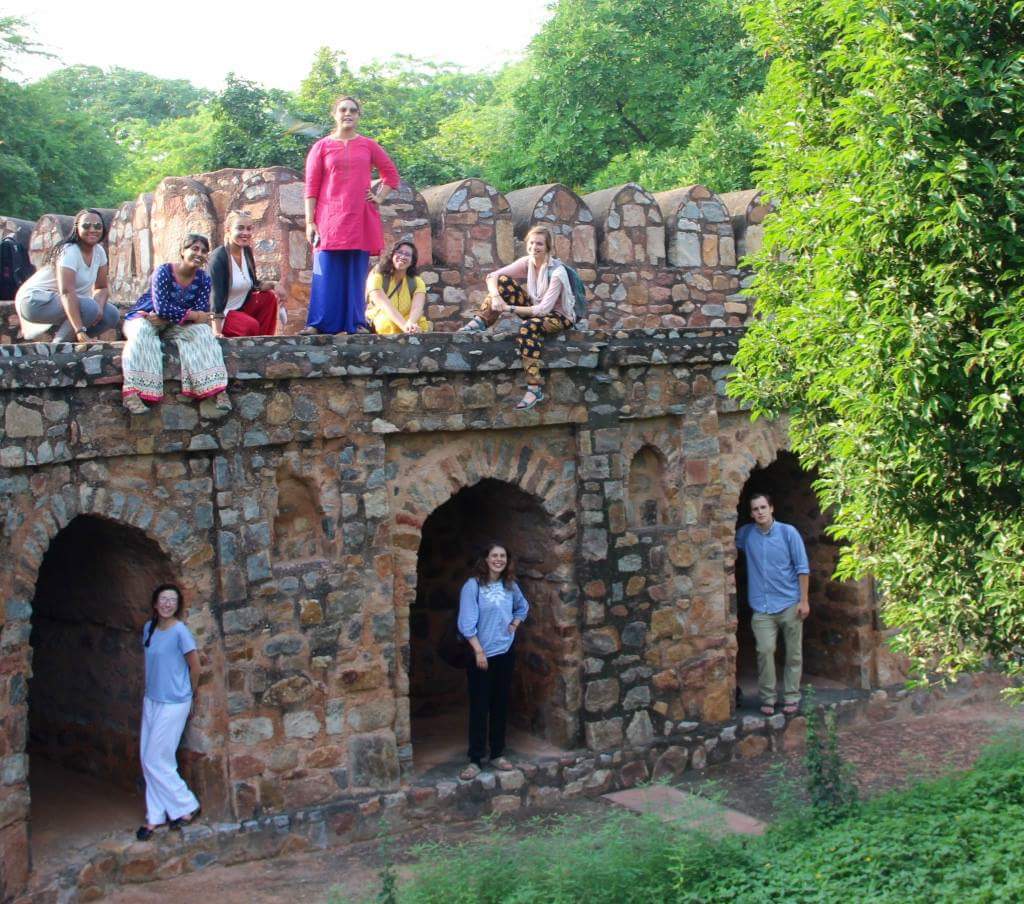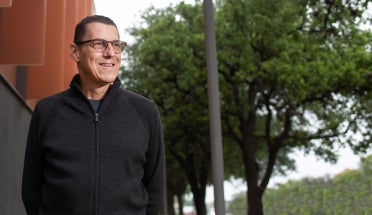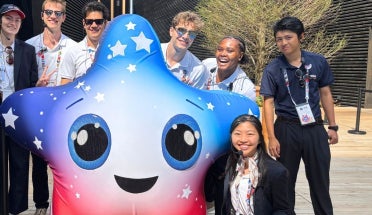
Be a Sponge: Taking on Public Health in India
- Feb 2, 2018
- Education Abroad
For Jessica Ellis, a senior majoring in biology, every day and every experience during her study abroad in India shaped her.
The biggest takeaways from study abroad are different for everyone, but no one comes home the same. Studying abroad is a transformational experience, both academically and personally, and that is the whole point.
“I learned how to be a sponge. It is just an attitude that I started to use as soon as I would wake up in the morning,” she describes."I would absorb everything and let all this knowledge mold me instead of trying to do anything."
Ellis traveled to India as part of the program Public Health, Community Advocacy, and Policy. In this profile, she discusses why she chose that program, how it prepared her for an internship in Washington, D.C., and how research factors into study abroad.
What motivated you to study abroad?
I lived in London for thirteen years and then I came back to the US. I traveled a lot around Europe but I needed to do a lot of learning and exploration. Almost all my friends have gone abroad. They are all into studying abroad and getting an international experience. So, it was a given to me, I just did not know where to go.
How did you select your program?
I knew I did not want to go to Europe again because I grew up there. I wanted to go somewhere where I could see really pressing public health issues. I went to the Education Abroad Fair at UT and I learned about the SIT program in India. Thuy Nguyen was my program coordinator, and she was really great.

Did you know much about India before going abroad?
I did a lot of research before going abroad. I looked at a series of things including images that showed what India and Delhi looked like. I also investigated the language. In the beginning, I knew very little, but I did a whole lot of “googling.” I also had to do a presentation to my parents because they were a bit nervous about it. Especially because they were going to help fund the trip, so they wanted to make sure that I was going to be safe. It took a lot of research to satisfy my interest and my parents’ concerns.
Tell us about your program in India.
I went to a SIT (School of International Training) program and at their New Delhi campus. The program was called Public Health, Community Advocacy, and Policy.
We also had Hindi classes, which were really small for intensive learning. They had four students to one professor. We had Hindi from 9:00AM to 1:00PM every day. The first two weeks were really hard. After that, it was conversational which was really fun.
In the afternoons we rotated between a class focused on public health in India and one on research methods. The public health course covered one or two lectures of one topic. It was really great because we got to know our professors so well. The guest speakers were really informative, too; they all had industry experience.
The research methods class prepared us for the last month of the program which was an independent research project. We took classes for three months and the last month went out to the country to do our fieldwork.
What issue did you explore in your research project?
I went to a city called Udaipur which is in Rajasthan in western India. I researched soil-transmitted helminthiasis, which is basically three worms: hookworm, ringworm, and roundworm. I studied how eradication methods of those three diseases have affected different communities within the rural tribal areas surrounding Udaipur.
I looked into how eradication efforts of those three diseases had affected them and how people were aware of them and then the different perspectives where I interviewed government, NGO, and medical sector people and talked about how they all interacted with each other on these eradication methods. I learned about these three diseases through the UT group (END7). I've one a lot of advocacy for these diseases and so I had background knowledge and I wanted to see how eradication efforts looked like in India.
What did you learn from studying abroad in India?
I learned how to be a sponge. It is just an attitude that I started to use as soon as I would wake up in the morning. I would absorb everything and let all this knowledge mold me instead of trying to do anything.
For instance, my professor grew up in a small and poor village in the northern part of India and he took us to his family's home and brought us inside his village. We had to assume this position of observing and I did not like the idea of observing so I used the word 'sponging' because you did not just want to watch and have that separation between you and the people who you are with. You have to be a sponge and absorb everything you are seeing and hearing. You need to soak it up and not feel the need to speak and change things rights away. Instead of exerting a ton of influence, it is important to listen and work together with the people living in these villages.
I think of this attitude when we talk about public health. In this field, it seems that you are trying to fix a problem in a place that is far away. Instead you have to visit the place and be a sponge.
Do you think that studying abroad has contributed to your professional development?
Yes. I feel stronger and more equipped to work in global health. It gave me a lot of connections and a lot of insight. And it seems that my experience is really interesting to employers.
My program was great because there were only thirteen students and four professors. The professors got to know us on a very interesting level because we were pushed to our limits. We had really close ties with them and were encouraged to reach out to them if we needed letters of recommendation.
Did you experience culture shock?
I knew what everyone tells you about the Delhi. The smell of the streets and the food and even the eating patterns and the daily schedule—all very different to the US. I was prepared for that. I knew food would be different and Delhi would be super crowded with a whole different range of social economic statuses.
Living with a family was the biggest shock. The family situation was great and I loved it. I could not imagine what it would look like to commit and live with a host family. While there were some cultural differences, it was a fantastic and enriching experience. I stayed with a six-person family and then myself and another student in a three-bedroom apartment. There were three generations of people living there. I was extremely comfortable at all times and spent a lot of time in my new living space. The home was lovely and it was set in a great location within the city. It was different, but it was also very similar to an American one.
What was your favorite part about studying abroad in India?
Getting to the point where I could function as a person who lived in Delhi and who lived in India. Understanding cultural cues and people's interactions; how the city works and feeling like a functional person in a completely different city. That was probably my favorite part and the whole process to get there. Like you mess up one day and you don't know how much a cab should be and you don't know that this is a holiday and therefore you can't go to a certain place. Figuring out that stuff is really fun.
Do you think science majors should study abroad?
Research is becoming more and more international. Whether it is molecular biology or physics or anything else. Seeing the level of universities in other countries and witnessing what students are doing there is really important in the sciences. Studying abroad provides a huge benefit by helping you understand what others are doing.
Do you have any advice for students who are considering studying abroad?
Look at what you are interested in and definitely consider Asia. India was a very obvious choice for me because of the issues I was interested in, but Asia is really interesting and relevant right now in terms of political and economic alliances. I think that it is absolutely necessary to understand something about Asian cultures. Learn a language and do your research. Look at how your academic topic can be relevant and all of the things you can do.
Thinking of studying abroad? To learn more about study abroad programs offered through Texas Global, visit the Education Abroad website.



